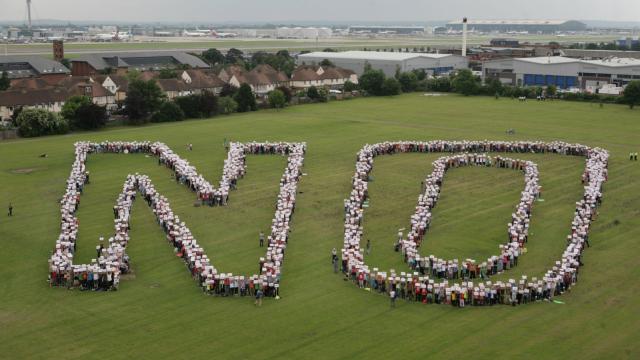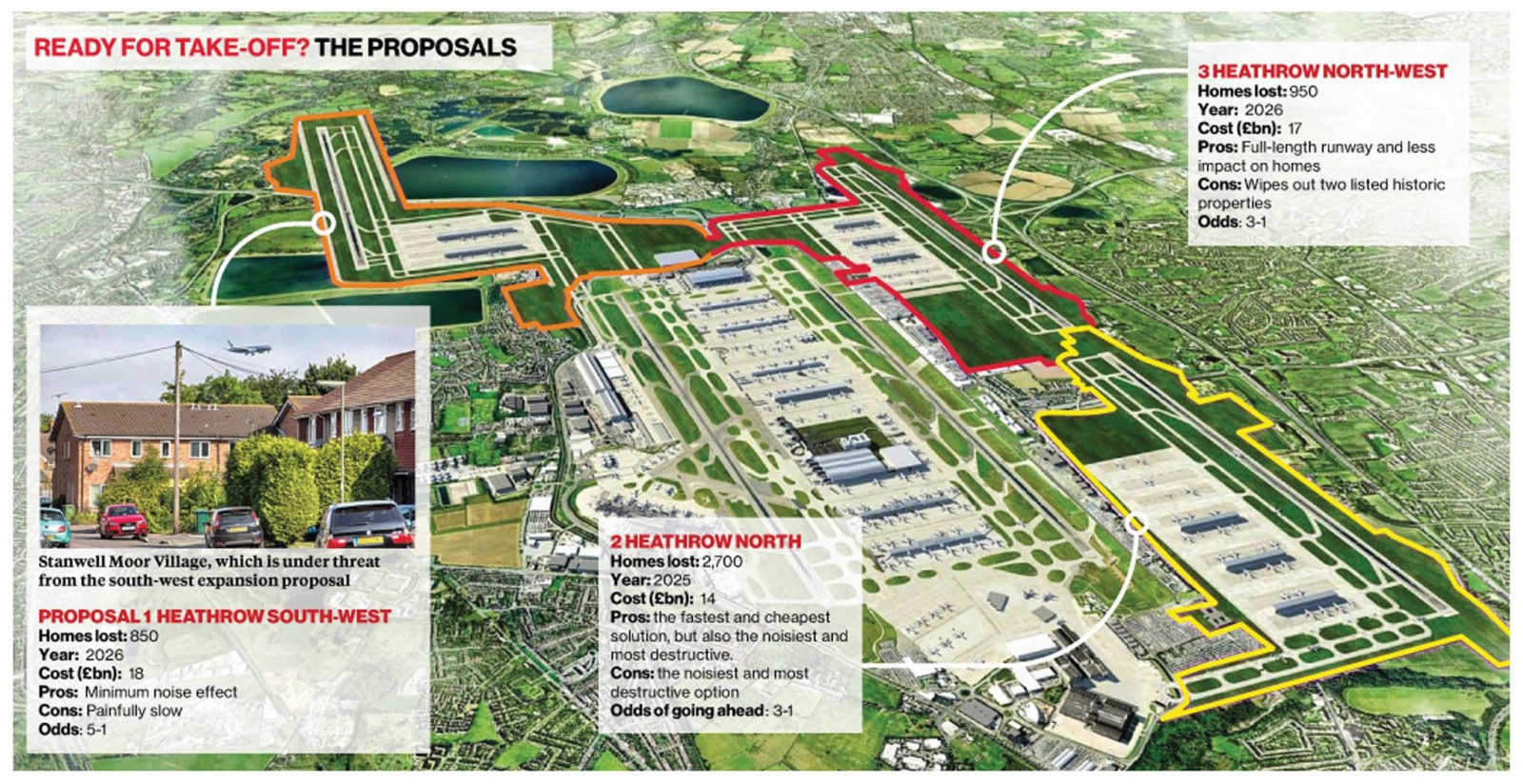
To the west of London, a visit to Grow Heathrow shows an eco-village bustling with alternatives. Many residents tend crops, grown organically and shared communally. Others are focusing on creating an irrigation system in the workshops, which have been crucial for creating their numerous sustainable technologies.
Meeting the residents reveals that the community is organized on horizontal principles, based on consensus. Their achievements to date are impressive, while their plans provide further solutions on how society could meet its energy needs sustainably.
Resisting Air Travel’s Expansion
Besides being a hub for alternatives, Grow Heathrow is a focal point against air travel’s expansion. A site earmarked for a third airport runway would destroy the villages of Sipson and nearby Harmondsworth to Heathrow’s north. Three years ago, activists squatted an abandoned market garden in Sipson; their first task was to clear away 30 tons of rubbish. Meanwhile, their presence deterred hard drug users from using the site.
Heathrow is already Europe’s largest airport, last year transporting over 70 million passengers. But with big business backing, the UK government wants to expand it further. Different sites have already been mooted, due to their foreseen ecological damage and impacts to local communities.
From a global ecological perspective, air travel is a key climate change battleground. Earlier this year, the Guardian reported how aviation is recording the fastest growing greenhouse gas emissions of any sector — an amount that is predicted to rise sharply in coming years.
Progress Now!
“Grow Heathrow is about showing people how to live well,” explains one resident, Lizzy Honest, who is showing me around. “It’s about building a community locally and internationally, which considers the well-being of every person and the planet.”
A tour of the site begins in the meadow that blooms with many organic fruits, vegetables and herbs. “It is important to know where your food comes from,” Lizzy says. From there we move on to large greenhouses that provide ample space for a camp kitchen, a communal area, a plant potting space, a free shop, an arts and crafts zone, a brewing area, and a welding section alongside a well-equipped and organized workshop. Above the workbench a sign reads: “Every revolution needs its tools, remember to put them back.”
An eco-shower has been constructed next to the greenhouses, and the residents are proud of its effectiveness. A small enclosed fire sits below a reclaimed ex-household radiator. Two pipes connect this to a water vessel on a scaffold tower. When lit, hot water cycles into the tank and cool water drops to the radiator and within 20 minutes the shower is ready.
The eco-village generates power from solar and wind. Eighteen months ago they installed a wind turbine on a tower. “This was constructed completely on site, including shaping the blades from recycled parts and casting the magnets and it has only been taken down once to grease the moving parts,” Lizzy explains. Working alongside this are large solar panels that enable the residents to charge laptops and mobiles and run lighting. Heating the many buildings comes from “rocket stoves”, comprised of welded reclaimed scrap metal.
The compost toilets are also a low energy alternative. The “humanure” created is surprisingly smell-free and gets recycled onto crops after two years. As Lizzy suggests, “the Western idea of transporting sewage is really intensive, and many societies such as China have kept to using local solutions.”
Growing Alternatives
Grow Heathrow’s community of around 30 activists is organized horizontally with a handful of weekly meetings focusing on different priorities. These run alongside the communal work and activities such as weekly yoga in a large yurt. Lizzy tells me the site meeting often discusses new people joining the community.
“Anyone can come and visit two weeks and if they want to stay longer [they] will propose this to the community. Next they’ll take a week away and the residents consider their proposal with the 'observe, act and then reflect principle', which comes from permaculture," she says. "This same notion was applied in the decision to occupy the site. Activists observed the site for six months and liaised with the local community, before starting the eco-village.”
A skill sharing focus also appears key to Grow Heathrow’s momentum and longevity. “Often residents bring their own skills, for instance someone came to the site with the knowledge of how to build a turbine,” Lizzy continues.
“We also have workshops where experts come to share skills, like the new biodigester plans and the eviction resistance workshops. Other times we just brainstorm new ways to solve problems. We ran out of trowels recently, so we cut up old cyclinders and attached them to the handles of broken tools. The result was better than if we had of bought them.“
After the tour, I meet another resident who wants to keep his anonymity, but is enthusiastic to explain plans behind creating methane on site, through a biodigester, and installing a gasifying wood burner. He also talks about forging their own tools.
“There is no point in thinking you’re creating a revolution, if you have to go to buy your tools from a DIY shop,” he says, telling me he recently finished a blacksmith course. “We are just finalizing and drawing up the plans to build a forge. From a sustainability [perspective] we can build tools that will last and are far more durable than the shop-bought ones.”
(A biodigester creates methane that can be bottled for heating or lighting. It works by filling a sealed container with organic waste, and the limited air speeds up the process of rotting. A gasifying wood burner involves superheating wood in an environment with limited air; the exhaust gas is flammable and burning it is a highly efficient way of burning wood, especially to heat water.)
While explaining these projects, the resident describes what they meant to him about the future of sustainable energy: “What we are saying with these projects is not that people will live without any carbon footprint, but instead we can avoid mining it and only use the carbon we grow.”
3 WAYS TO SHOW YOUR SUPPORT
- Log in to post comments














